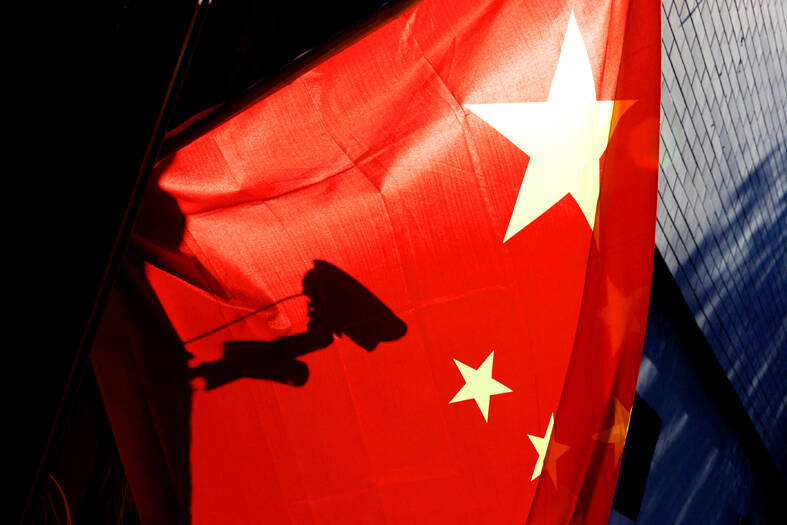The Supreme Court on Thursday finalized a ruling sentencing a father-son duo to eight years in prison each for espionage.
The court upheld a previous High Court ruling convicting Huang Lung-lung (黃龍瀧) and his son, Huang Sheng-yu (黃聖峪), for contravening National Security Act (國家安全法) provisions by funding and developing an organization for China and collecting confidential documents in exchange for monetary rewards.
Two air force members, Su Kuan-ying (蘇冠穎) and Yeh Hsin-liang (葉鑫亮), were also found guilty of agreeing to work in the spy network.

Photo: Reuters
Judges upheld a seven-year sentence for Su and a six-year term for Yeh.
Su and Yeh were convicted for contravening Article 20 of the Criminal Code of the Armed Forces (陸海空軍刑法), which prohibits military personnel from disclosing or delivering documents, information or records of a secret nature concerning the nation’s defense. They were also convicted of taking bribes in contravention of the Anti-Corruption Act (貪污治罪條例).
The verdict is final and cannot be appealed.
“The Huang father and son were oblivious to the needs for safeguarding national security, and recruited military personnel to develop an organization for the enemy force... They collaborated with Chinese intelligence officials to obtain high-level confidential military material in exchange for monetary rewards,” the court said.
“Their spying lasted for about five years, resulting in serious harm to national security. Therefore, the Huangs are to be sentenced to eight years,” it said.
Investigators found the Huangs, originally based in Tainan, started doing business in China’s Fujian Province in April 2015, where they were approached by China’s Taiwan Affairs Office (TAO) Fujian branch office member Zhong Dongsheng (鍾東生) — who is also a Chinese intelligence officer — and TAO Guangzhou office member Zhang Xiaofeng (張曉楓) in 2019, the court said in its verdict.
Zhong and Zhang persuaded the Huangs to recruit Taiwanese military members willing to acquire military secrets, promising cash rewards.
From March 2017 to August 2021, they approached the younger Huang’s former sports teammates and classmates, air force personnel Yeh and Su, to obtain military materials, while two others, surnamed Chin (金) and Hsieh (謝), refused to join the spy network.
Investigators found China had channeled money to the Huangs to fund the network, which collected information on the annual Han Kuang exercise, took photos inside military bases, and reported officer names, identification numbers and unit information.
During High Court trials, judges ordered the money provided by Chinese handlers to be confiscated — NT$1.26 million (US$39,449) for Huang Sheng-yu, NT$456,000 given to the elder Huang, of which NT$210,000 the Huangs gave Su in rewards and NT$100,000 they handed to Yeh.
Additional reporting by Jake Chung

Taipei, New Taipei City, Keelung and Taoyuan would issue a decision at 8pm on whether to cancel work and school tomorrow due to forecasted heavy rain, Keelung Mayor Hsieh Kuo-liang (謝國樑) said today. Hsieh told reporters that absent some pressing reason, the four northern cities would announce the decision jointly at 8pm. Keelung is expected to receive between 300mm and 490mm of rain in the period from 2pm today through 2pm tomorrow, Central Weather Administration data showed. Keelung City Government regulations stipulate that school and work can be canceled if rain totals in mountainous or low-elevation areas are forecast to exceed 350mm in

EVA Airways president Sun Chia-ming (孫嘉明) and other senior executives yesterday bowed in apology over the death of a flight attendant, saying the company has begun improving its health-reporting, review and work coordination mechanisms. “We promise to handle this matter with the utmost responsibility to ensure safer and healthier working conditions for all EVA Air employees,” Sun said. The flight attendant, a woman surnamed Sun (孫), died on Friday last week of undisclosed causes shortly after returning from a work assignment in Milan, Italy, the airline said. Chinese-language media reported that the woman fell ill working on a Taipei-to-Milan flight on Sept. 22

COUNTERMEASURE: Taiwan was to implement controls for 47 tech products bound for South Africa after the latter downgraded and renamed Taipei’s ‘de facto’ offices The Ministry of Foreign Affairs is still reviewing a new agreement proposed by the South African government last month to regulate the status of reciprocal representative offices, Minister of Foreign Affairs Lin Chia-lung (林佳龍) said yesterday. Asked about the latest developments in a year-long controversy over Taiwan’s de facto representative office in South Africa, Lin during a legislative session said that the ministry was consulting with legal experts on the proposed new agreement. While the new proposal offers Taiwan greater flexibility, the ministry does not find it acceptable, Lin said without elaborating. The ministry is still open to resuming retaliatory measures against South

1.4nm WAFERS: While TSMC is gearing up to expand its overseas production, it would also continue to invest in Taiwan, company chairman and CEO C.C. Wei said Taiwan Semiconductor Manufacturing Co (TSMC) has applied for permission to construct a new plant in the Central Taiwan Science Park (中部科學園區), which it would use for the production of new high-speed wafers, the National Science and Technology Council said yesterday. The council, which supervises three major science parks in Taiwan, confirmed that the Central Taiwan Science Park Bureau had received an application on Friday from TSMC, the world’s largest contract chipmaker, to commence work on the new A14 fab. A14 technology, a 1.4 nanometer (nm) process, is designed to drive artificial intelligence transformation by enabling faster computing and greater power